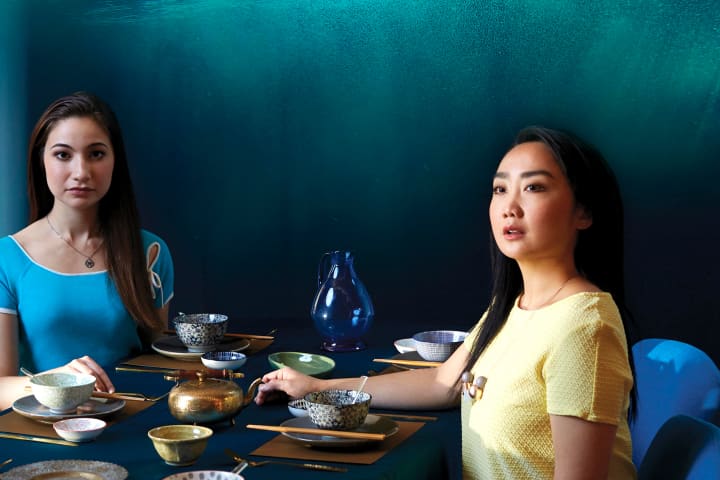Emina Ashman explores her unconventional character in Jean Tong’s play Hungry Ghosts.
What attracted you to your role?
In essence, my character (Number 1) represents one part of the play’s protagonist’s subconscious (Number 2). I was attracted to the strength and directness in Number 1’s voice, which contrasts to mine. I feel like there is a certain grittiness, fire and realist mentality that comes through this voice in the play for me. I think my character’s function is to shape-shift and portray the different manifestations of the protagonist’s rage at all the corruption in Malaysia, whether it be through an aggravated older sister or frustrated family victim. The play’s perspectives on law and justice (or lack of) in Malaysia that tie into the theme of power and politics in this play, was an aspect I surprisingly wanted to interrogate further through playing this role. Also, there’s a delight in embodying characters that feel close to ‘home.’ The role allows me to have a bit of fun with Malaysian accents and voices I don’t usually get to play with on stage. I’m fortunate to be part of a process that encourages me to bring my own concrete understanding of Malaysia, through my lived experience of calling it home for nineteen years.
What were your first impressions of the play and what compelled you to say yes to this production?
From an initial read of its early draft, I was immediately drawn to how sharp, clever and thought-provoking Jean’s writing is. I was curious as to how I could be a part of the story-telling of this ethereal world she creates in Hungry Ghosts through her fragmented, stark, cerebral language. It’s also rare for a play to come along to mainstream theatre that explores cultural identity of a Malaysian girl who moves to Melbourne that I can resonate with, who understands the guilt trips, shame and a sense of restlessness from leaving her place of birth and feels like she hasn’t quite landed anywhere.
Can you tell us what you enjoy most about the Jean Tong’s writing?
It’s seditious. It’s sharp. It’s playful and political. I think Jean’s writing also plays on the empathic and ethical tensions in the people who read her work. I love the dexterity in the language she uses and how she dares to play on the audience’s psyche in a subtle yet ruthless manner. The post-dramatic style of Hungry Ghosts’ writing was going to be a new challenge for me when it came to realising this material on stage. I wanted to bear witness and be a part of its transformation from the inside of the rehearsal room.
Can you tell us about some of the challenges of this script?
One inquiry that was present with me in the rehearsal room was how could we detect and draw out the heartbeat of this piece. How can we viscerally connect with our audience? As an actor on this script, it’s been a challenge at times trying to uncover the intention of a scene and my function in them amidst all the word-play in the script. In the rehearsal room, I have found myself easily seduced by the rich, vivid poetry within this play. There are a lot of repeated lines and descriptive images that can be lost to an audience, if we as actors, don’t ground them in action. Another challenge was working on a script that really hit home on a personal level and brought up my relationship to family and loss.
Do you think this is an important story to tell? Why?
Absolutely. Hungry Ghosts revolves around the complexity of cultural identity and that feeling of clinging on to whatever you make of that word, to define you. I think it transcends the narrative of a Malaysian abroad, and speaks to the experience of anyone living away from home and missing family. Working on Hungry Ghosts has given rise to an awareness of blind spots that I’ve had in relation to my cultural upbringing as it’s made me shift my perspective of how I view home. By delving into this script, it has made me face up to my own love and hate relationship to Malaysia in some regard. I’ve realised homesickness isn’t craving nasi lemak or enjoying seditious banter on our current political climate, it’s missing my mum and siblings…it’s all the little things I keep forgetting but want to remember again. Hungry Ghosts is like a diary I can easily read and relate to. It’s messy, it’s tangled and it’s full of confessional clutter that I feel can resonate with a lot of people watching this. I love how Jean’s writing touches on those moments of reactions people experience as soon as they touch down at home and as soon as they leave again.
What is unique about your director Petra Kalive’s rehearsal room?
There has been a lot of support and warmth in our rehearsal room, built from a sense of professionalism, trust and play. It’s been a very light-hearted, positive rehearsal space. My fellow cast members are punning at an alarming pace and the creatives are occasionally cracking jokes (or at least putting up with ours) whilst we work on this fairly dark and tricky play. I have also never worked with a director who is so set on creating clarity for an audience whilst attempting to honour the writer’s vision. Petra has shown a lot of patience and care, towards her actors, towards the creatives and towards the piece as a whole.
What is at the heart of the play?
Home. Does leaving home bring you closer or further away from it? How strong are those cords you have to where you came from? Can you cut them? Do you need to?
Hungry Ghosts plays at Southbank Theatre, The Lawler 3 – 19 May, before commencing a Regional Tour.
Published on 7 May 2018





